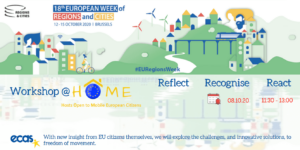

Last week saw the launch of the 18th edition of the annual European Week of Regions and Cities, with 70 unique online workshops exploring different aspects of empowering citizens. This theme marked the start of the three-week event, during which EU decision-makers, civil society and administrations around Europe meet to discuss current challenges facing European democracy and to celebrate municipalities and regions in their ability to invest in growth and uphold good administration.
ECAS had the pleasure of participating in three #EURegionsWeek workshops, with our team sharing their thoughts on: the potential of digital technologies to strengthen European democracy, the role of regions in enhancing participatory democracy through the European Citizens’ Initiative and, the consequences of the covid-19 pandemic for mobile citizens and EU freedom of movement. Keep reading to find out the major takeaways and talking points of each discussion!
 Workshop: No Lockdown for e-Democracy
Workshop: No Lockdown for e-Democracy
An important societal transformation is taking place throughout Europe and across the world, with the emergence of a deliberative-collaborative e-democracy model that is contributing to a more open and inclusive form of policy-making. The covid-19 pandemic has further attested to the ability of digital tools to engage and empower citizens, especially where traditional methods fall short. With some restrictive measures limiting fundamental freedoms throughout Europe, e-democracy has been able to maintain a democratic attitude against undemocratic tendencies.
However, to take advantage of the opportunities presented by information and communications technology (ICT), we need to also take stock of the resulting challenges, such as online disinformation.
Highlighting this aspect, ECAS Participatory Democracy Manager, Flavio Grazian, shared findings from the Smart eDemocracy Against Fake News (SMARTeD) project, which seeks to foster European citizenship and tackle online disinformation. Targeting seven EU countries, the project offers different perceptions of a common problem, which ultimately have fed into recommendations to the EU and Member States on how to tackle disinformation and better protect citizens in this regard*.
As the problems identified at the start of the project two years ago are still relevant today, similar recommendations have recently been discussed by the European Commission, and stronger actions in the field are expected to follow.
No one left behind – Empowering citizens to participate in democratic processes
The covid-19 crisis brought a halt to many everyday activities but not to political engagement. The session highlighted how during the pandemic, online democratic participation has seen an unprecedented level of engagement. The European Citizens’ Initiative, the first trans-national instrument of participatory democracy which allows the European citizens to shape the EU policy agenda, for example, has had a more diverse array of actors using the tool than ever before. However, awareness of such participatory democracy instruments needs to be greatly increased, and stakeholders must work together to do so.
“We need to rethink democratic models for the digital era. E-tools can act as a vital complement to traditional methods of citizens participation in the political life of democracies”. – Flavio Grazian, ECAS Participatory Democracy Manager
As outlined during the workshop, there are many examples of democratic innovation, which rely predominantly on online collaboration. Methods such as crowdsourcing have been used to tap into the wisdom of the crowd on issues ranging from climate policies to how a city’s budget should be spent. These type of participatory initiatives boost the efficiency of our democratic societies, especially since collecting wide citizen input would be nearly impossible to do offline. There is, however, a need to take into consideration the challenge of a digital divide. A recent study by the European Commission found that 42 percent of EU citizens are not fully equipped to navigate the digital world. To effectively foster inclusion and democratic engagement, there must be further promotion of and investment in media literacy programmes for citizens at a regional, national and European level.
The panel concluded with the notion that in order for e-participation to be truly meaningful, we must ensure that citizens’ input has a tangible impact and that this impact is communicated back to them.
You can watch the full worlshop here.
*To find out more about the Smart eDemocracy Against Fake News (SMARTeD) project and their recommendations for civil society and policymakers, be sure to check out the dedicated project website!
 Workshop: My Citizen’s Voice in the EU!
Workshop: My Citizen’s Voice in the EU!
European democracy depends upon the active participation of citizens at all levels of society. The ‘My Citizens’ Voice in the EU’ session built upon this principle, with discussions on the important role that local and regional authorities play to engage citizens with EU participatory democracy via the European Citizens’ Initiative (ECI) tool.
Opening the discussion, organisers of two ECIs used their experience as an example to illustrate the impact regional contribution can have. Local civic engagement was integral to the ‘End the aviation fuel tax exemption in Europe’ initiative, where civil society organisations contributed greatly to raising awareness on the campaign.* In the same vein, the support of regional authorities and local stakeholders was pivotal to the success of the Minority Safepack Initiative, which embraced a localist approach in the Region of Southern Denmark, the Basque Country and South Tyrol to frame their campaign to the unique contexts of each region, making their cause tangible to citizens at a grassroots level.
ECAS Executive Director Assya Kavrakova further underlined that as actual change takes place at a local level, there is a wide untapped potential of local support. In order for the European Commission to propose any legislative action as a response to an ECI, organisers need to collect a minimum of one million signatures of support. This process has become extremely difficult in the face of the covid-19 pandemic, as organisers have to abandon offline activities and campaign primarily online. Besides an intensified battle for online attention, this poses the challenge of a digital divide between citizens in using online tools. Regional stakeholders can implement concrete, tailored measures to help organisers overcome this. By investing in digital skills and competences, they can ensure that the online space is accessible to everyone. Local and regional governments can further assist in reaching a wider audience by providing a call for signatures on their websites, help organisers tailor messages to the specificities of the region and needs of its citizens, and organise discussions on the initiatives’ topics as part of the European public sphere. Perhaps most importantly, regional authorities can follow up on a European Citizens’ Initiative by adopting concrete measures (regulatory or practical) in response to citizens’ demands.
You can watch the full workshop here.
The European Citizens’ Initiative gives EU citizens the unique opportunity to shape the legislative agenda of the EU. Organisers can get support on ALL levels – from legal and campaigning experts’ advice to connecting with like-minded EU citizens, on the dedicated Forum.
*To find out more about the success and struggles of Timothée and Tassos’ ECI campaign, read their tips for the ECI blog post published in April 2020 on the European Citizens’ Initiative Forum.
** To find out more about the Minority Safepack Initiative and their organisers’ advice to new initiatives, head over to the European Citizens’ Initiative Forum and read their blog post on how to adapt to the covid-19 circumstances.
 ECAS Workshop: @HOME : Hosts Open to Mobile Europeans – Empowering citizens begins where their home is
ECAS Workshop: @HOME : Hosts Open to Mobile Europeans – Empowering citizens begins where their home is
ECAS’ final workshop of the week shifted the focus onto mobile EU citizens and sought to reflect, recognise, and react on the impact that the COVID-19 pandemic has had on this group of citizens and freedom of movement.
REFLECT: ECAS Citizens’ Rights Training Coordinator Petar Markovic shared some preliminary findings from the ongoing ECAS empirical research into the impact of the pandemic-related measures, which support the notion that mobile EU citizens have been hit disproportionately hard by covid-19. Due to border closures, they have experienced a ‘double lockdown’ from their host and home communities. Many have also faced a sudden halt in their access to residency rights in their host countries and a frightening majority are experiencing consistent mental health issues as a result of lockdown measures. Patrycja Pogodzinska from the European Union Agency for Fundamental Rights (FRA) asserted that lockdown measures had raised legal concerns for fundamental EU citizens’ rights and that worrying gaps had been revealed for the level of support available for socially excluded groups such as Roma and travelers.
RECOGNISE: Amidst current freedom of movement challenges, the workshop also aimed to highlight positive efforts to overcome them. ECAS Communications and Outreach Coordinator Raia Mihaylova introduced the ECAS Awards 2020 for ‘Most EU Mobile Citizen-Friendly Location’, which aim to recognise cities’ and regions’ efforts to enhance freedom of movement and foster the inclusion of mobile EU citizens in their host societies.
Looking for a comprehensive picture of the different ways mobile EU citizens are integrated, initiatives were submitted in the following categories:
Based on a set criteria, nine different initiatives were selected for the competition. They range from establishing a consultative council dedicated to European citizens to ones that aim to overcome the language barrier between EU citizens, and ones that that ensure mobile EU citizens can exercise their right to vote regardless of where they live. Besides bringing recognition to these important practices, the awards aim to motivate others to take similar leads in their regions and cities.
You can learn more about the participating initiatives and submit your vote for your favorite ones here.
REACT: In anticipation of the full restoration of freedom of movement, Eoin Young of the International Centre for Policy Advocacy (ICPA) outlined the need for positive, value-based stories to be written in the months to come to reduce levels of the general public’s anxiety about mobility and migration in Europe. Guiding participants on methods to do so, he shared the Reframing Migration Narratives Toolkit, a set of resources for progressive campaigners working to put diversity and inclusion back on the public/policy agenda and counter populist narratives.
Closing the workshop, Ecaterina Constantinova presented an ECAS collaborative project – Improving Inclusion of EU Mobile Citizens (IMPEU). The project was formed based on the notion that many of the obstacles to freedom of movement rights can be addressed through civil servant training. This gave birth to the IMPEU MOOC, which aims to equip national public administrations with the tools to better serve the mobile EU citizens in their country. In the context of covid-19, the platform is even more relevant, as it gathers in one online place all the relevant information to inquire about EU citizens’ rights and elevate civil servants’ knowledge.
You can watch the full workshop here.